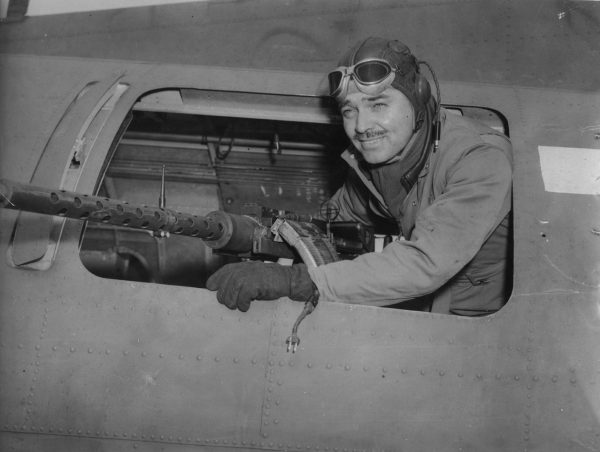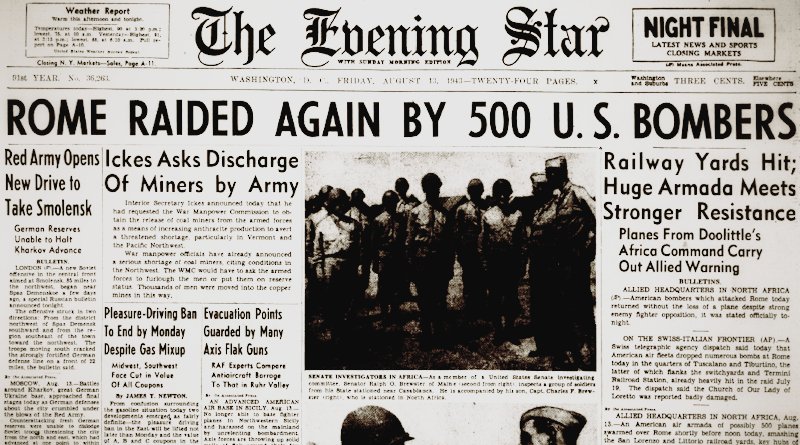World War II Chronicle: August 13, 1943
Click here for TODAY’S NEWSPAPER
Front page: two senators are pictured inspecting the troops in North Africa. Richard Russell Jr. (D-Ga.) served in the Naval Reserve during the World War and Owen Brewster (R-Maine) was a captain in the National Guard. Both are former governors… IX Bomber Command has targeted Rome again, with hundreds of B-17, B-25, and B-26 bombers supported by P-38 Lightnings hitting targets in the Eternal City…
Hollywood actor-turned Army Air Force captain Clark Gable discussed his third combat mission following yesterday’s attack in the Ruhr Valley (see page three). He stood next to the top turret gunner’s position for the entire flight and, unbeknownst to him at the time, was nearly killed when a 20-mm shell took off the heel of his shoe. Fortunately the round didn’t explode, one of many hits the B-17F named Ain’t it Gruesome took during the raid. On his very first mission, he got frostbite on his fingers. Capt. Gable is assigned to the 351st Bombardment Group…

George Fielding Eliot discusses the air power situation on page six… Sports section on page 18, which mentions that the college football all-star squad has put together the fastest backfield ever assembled for their game against the Washington Redskins on Aug. 25. Meanwhile, Colorado State and Brigham Young universities have dropped their football programs for the 1943 season…
Roving Reporter by Ernie Pyle
SOMEWHERE IN SICILY — All my life I have enjoyed being in hospitals, as soon as the original moaning-and-groaning stage was past, and my recent time at a front-line army clearing station was no exception.
On the third day I was scared to death that I was well enough to leave. But the doctor looked thoughtful and said he wanted me to stay another day. I would have kissed him if he had been a nurse instead of a man with a mustache and a stethoscope.
That was the only trouble with our hospital, it didn’t have any nurses. In fact we lacked a number of the usual hospital touches. We were hidden, inevitably, in an olive grove, and our floors were merely the earth. The toilet was a ditch with canvass around it. And if you washed you did so in your own steel helmet. There were no such things as hospital pajamas or bathrobes. I arrived in my Army coveralls and left in my coveralls, and I never once had them off all the time I was there.
During the day they kept the sides of our tent rolled up, and it was peasant enough lying there with nothing to do. But at night the tent had to be tightly closed for the blackout, and it became deadly stuffy. And all night long the litter-bearers would be coming and going with new wounded. It made an eerie scene in the dim glow of our single lantern, and sleep was almost impossible.
So the last couple of nights we moved our cots outdoors and slept again under the wide starry skies of Sicily, and attendants brought our medicine out there in the dark. German bombers came over but we just lay there. Every morning a chaplain would come around with a big box-ful of cigarettes, tooth powder, and stuff.
The doctor had me on a liquid diet at first, but I gradually talked him into advancing me to a soft diet and finally to a regular one. That progression from liquid to soft to regular diet was one of the greatest experiences of my life, for, believe it or not, they were all three exactly the same thing — soup and canned tomato juice.
When I accused the doctor of duping me he grinned and said: “Well, it comes under the heading of keeping the patient happy by pretending to humor his whims.”
Happy! I was hungry! But as you see I survived, and actually I must say I have never been treated more grandly anywhere than by those doctors and men.
During the time I lay at the clearing station with my own slight aches and pains, hundreds of wounded soldiers passed through on their way back to hospitals in the rear. I was one of the five small tents in which they were deposited on litters while waiting for ambulances, so I lay right among them for four days and nights, and yet there was something good about it too.
The two main impressions I got out of it were (1) the thoughtful and attentive attitude of the doctors and men, and (2) the grand spirit of the wounded men themselves. I’ll write tomorrow about the second of these two.
As pitiful as wounded men are, it is easy to become hardened and cross with so many passing through your hands. You could eventually get to hate them and look upon them all as just so many nuisances who came deliberately to cause you more work. Yet the ward-boys treated their wounded as though they were members of their own family.
I paid particular attention as I lay there, and no wounded man ever made a request that a ward-boy didn’t go jumping to fulfill.
This was especially true of the ward masters, who are responsible for whole tents. There were three that impressed me greatly.
One was Corp. Herman Whitt, of End, Okla. Before the war he was a salesman for a biscuit company. He married a beautiful Indian girl back home. Corporal Whitt is tall, nice-looking, and talks very slowly and softly. He says he feels better about the war doing this job of caring for the wounded than if he were up there killing people himself.
One night wardmaster was Corp. Woodrow Cox of Milo, Okla. He too is taller than six feet, and he was a ranch hand back home, yet his voice is almost like a musical instrument, and he talks with that snail-like Oklahoma drawl that is so soothing in times of excitement.
The third was Corp. Rodney Benton, Oklahoma City. You could see the difference between city and country in these boys. Rodney was all git up and git. He talked faster and moved faster than the others. But all three had the same deep conscientiousness in their work and their feeling for the wounded.
Rodney is one of twins, and his identical Robert is a corporal in this division’s other clearing station. They are 23. Both had two years of pre-medical work at the University of Oklahoma, and they intend to be doctors. So you see they were in their glory here. In fact they almost drove the doctors nuts asking questions all the time.
Evening star. (Washington, D.C.), 13 August 1943. Chronicling America: Historic American Newspapers. Lib. of Congress.
https://chroniclingamerica.loc.gov/lccn/sn83045462/1943-08-13/ed-1/
